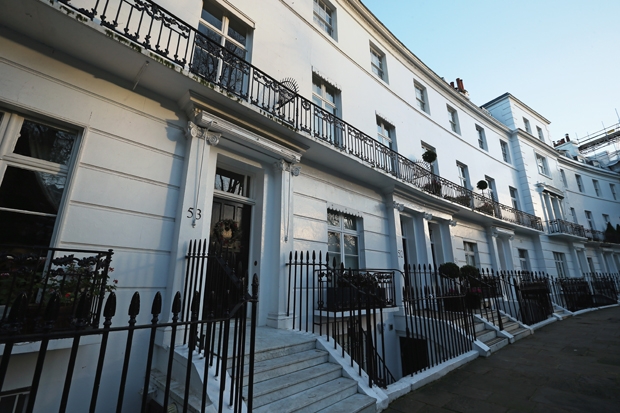Although I live in the country in Northamptonshire, I go to London often — almost once a week — and I find it more and more intimidating. This isn’t just because of the skyscrapers that spring up boastfully everywhere, parading one’s own insignificance, but also because of the aura of terrifying wealth that pervades its central area and now even its inner suburbs. Fifty years ago, when I got married, my wife and I bought our first London house in Kensington Park Road, Notting Hill, for £9,500. I wonder how many millions it is worth now. My parents, who were quite well off if not exactly rich, lived in Knightsbridge to be near my father’s office in Bowater House, an ugly modern glass block that straddled the entrance to Hyde Park opposite the end of Sloane Street. Bowater House has since been replaced by No. 1 Hyde Park, a Richard Rogers group of apartment buildings described on its website as ‘the most exclusive address in the world; a residential scheme whose beauty, luxury and service place it in a class of its own on a global scale’. A flat there sold the other day for £140 million.
London was then a great city, of course, as it always has been, but it was also cosy and modest about itself. Although ‘Swinging London’ was discovered in the Sixties, the city retained an old-fashioned air in which Harrods, later sold to Mohammed al-Fayed and more recently by him to the Qataris, was a haven in which old ladies with wicker shopping trolleys could take a rest in the great hall of the long defunct Harrods bank. Glamour was something one associated with foreign cities like Paris or New York. London was a city of exciting secrets but one that on the surface appeared rather slow and drab. It was a place where the old could feel quite relaxed and neighbourly. I doubt if that is any longer the case.
Since few normal people can afford to live there any more, at least not anywhere near the centre, the huge influx of foreigners is somewhat surprising. I don’t refer to the Russian oligarchs or Middle Eastern billionaires who may be fleeing complications at home or, more often, looking in the London property market for a safe and profitable haven for their ill-gotten gains. Nor do I mean the Poles or other East Europeans who come there to find work as builders and domestic servants to meet their needs. But I’m thinking about the well-educated young graduates from western Europe who are pouring in, in search of employment. Where will they be able to afford to live, and what jobs do they expect to find?
When I was last in Italy, a few weeks ago, I picked up a copy of the newspaper La Repubblica, to find an article headlined ‘London: Promised Land for Young Italians in Search of Work’. ‘Forget the Perfidious Albion,’ it said. ‘Forget the clichés about the coldness of its inhabitants, the wetness of the climate, or the excessive cost of living. The reality is different: Great Britain, and London in particular, are the new Eldorado for young Italians looking for a job.’ The facts supporting this statement were remarkable. During 2013, it said, the number of Italians under 40 years old who had emigrated to Britain had risen by 81 per cent from the previous year; and that of all Italians, whatever their age, had increased by 71 per cent. Until the end of 2012, Germany had comfortably topped the list of foreign countries to which Italians went, ‘but now even the German super-economy must bow to England, which has now arrived in top position, whereas in 2012 it was only the third most favoured destination’.
The British economy is on the up, but still not a patch on Germany’s, yet this is where Italians yearn to come. There must be more to it than job opportunities. Italians have good reasons to dislike the Germans. They also don’t much like the French, against whom we supported them in the 19th-century movement for Italian unity and independence. They have also, laughable though it may now seem, traditionally looked to us as an example of what a good, liberal, uncorrupt democracy should be. And also the attraction of Britain may owe something to Ukip for promoting the idea of this country as a nation seeking to free itself from the stifling bureaucracy of Brussels. But I expect it’s mainly the idea of London as the greatest, most thrilling city of Europe. Boris Johnson has controversially boasted of London being the sixth biggest French city on earth. But there are already probably more Italians there than Frenchmen. And what nobody seems to point out, there are actually many more Germans than either.






Comments